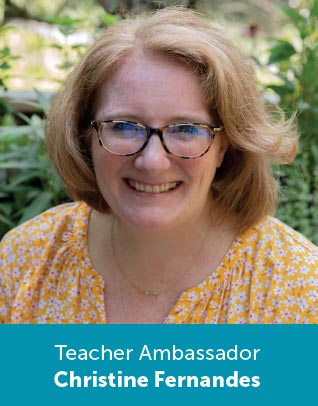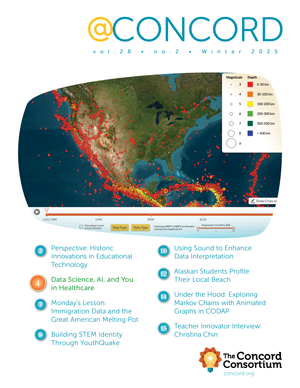News at Concord Consortium
25 Teacher Ambassadors

We are proud to announce a new Teacher Ambassador program. To commemorate our 25th anniversary, we are recognizing 25 outstanding teachers who have included our digital inquiry resources into their kindergarten to high school STEM classrooms. We congratulate them on their innovation and creativity. Learn more on our blog.
Watershed Awareness and STEM Careers
Across the country, every minute of every day, water glasses are filled from a tap, laundry is washed, and baths are run. How does the water get there? Where does it go? Who helps to assure that our water is safe? As the need for clean water increases with a growing population, so does the need for increased participation in water careers. A new project funded by the National Science Foundation (NSF) is aimed at broadening the population of students who believe they have the ability and skills to pursue STEM careers with certification and associate degrees, as well as with bachelor’s and higher degrees. The Watershed Awareness Using Technology and Environmental Research for Sustainability (WATERS) project is developing and researching a student-centered, universally accessible curriculum for teaching water concepts and water career awareness. The curriculum incorporates hands-on local data and geospatial analysis to explore geographic, social, political, and environmental concepts and problems related to watersheds. WATERS applies Universal Design for Learning principles to create a scalable approach to water learning that provides flexible information presentation and student responses, and offers appropriate supports and challenges.
Educating Designers for Generative Engineering (EDGE)
The University of Arkansas, Massachusetts Institute of Technology, the University of Illinois at Urbana-Champaign, and the Concord Consortium are collaborating on a new engineering design project funded by NSF. The goal of EDGE is to define, implement, and disseminate a new framework of design thinking based on the revolutionary technologies and methodologies of generative design driven by artificial intelligence. Design is being transformed by computation, and today’s engineers must understand how computers “think” in order to harness the power of generative design effectively. The new framework will be infused with computational thinking that empowers future engineers to consider design from a computational perspective. Project research will be based on our free Energy3D integrated computer-aided design and engineering software. A set of online learning modules in mechanical, energy, and civil engineering will guide students to solve authentic design challenges using both traditional and generative methods. With data collected from over 2,000 students, researchers will investigate how students’ design solutions improve and how their design thinking evolves as a result of transitioning from a traditional design method to a generative one.
Understanding Weather Extremes with Big Data
A new NSF-funded project aims to promote important scientific data practices and interest in big data science careers among middle school students in underserved New England rural areas. Understanding Weather Extremes with Big Data: Inspiring Rural Youth in Data Science is developing and researching four model curriculum units and an interactive experience with weather scientists. The two-week data investigation units provide students with hands-on opportunities to analyze and model large-scale weather data collected from Mt. Washington in New Hampshire (the highest mountain in the eastern U.S.), and data collected from students’ local weather stations. Students will describe, explain, model, and predict extreme weather events in their local settings and at Mount Washington Observatory, which has recorded some of the most extreme weather conditions in the world. Students will use the Common Online Data Analysis Platform (CODAP) and SageModeler to visualize, model, and analyze large-scale data. They will interact with weather scientists through virtual chats to both deepen their understanding of their own data investigations and to gain insights into scientific careers that use big data.
